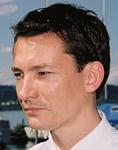Greetings and welcome to ESEC/FSE'05, the Joint 10th European Software Engineering Conference and 13th ACM SIGSOFT Symposium on the Foundations of Software Engineering!
ESEC/FSE is an internationally renowned forum for researchers, practitioners, and educators to present and discuss the most recent innovations, trends, experiences, and challenges in the field of software engineering. Held bi-yearly, ESEC/FSE brings together experts from academia and industry to exchange the latest research results, state of the art, and state of the practice. The conference offers an exciting program of events, including keynote talks by leaders in the field, technical paper presentations, workshops, tutorials, research tool demonstrations, and a doctoral symposium on innovative research in software engineering.
ESEC/FSE'05 takes place in Lisbon, a city with a rich and eventful history. According to legend, it was founded by Ulysses; Romans and Moors dwelled here for centuries. In the 15th century, it was the starting point for several of the sea voyages of the Discoveries Age that brought East and West closer together. Lisbon hosted the European Capital of Culture in 1994, a World Exhibition in 1998, and the UEFA Cup in 2004. All these and many other events left their mark, shaping Lisbon into a city that displays old and new architectural, gastronomical and cultural influences.
This year there were 201 technical paper submissions (the largest number of submissions to ESEC/FSE). Each submission was reviewed by at least three members of the Program Committee, and in many cases four. On the basis of these reviews, the Program Committee accepted 32 full papers for inclusion in the proceedings and presentation in the technical program. We were pleased that the quality of paper submissions was very high and the Program Committee spent a great deal of time deliberating and discussing final decisions in a face-to-face meeting.
Besides the technical papers, we offer research tool demonstrations, a doctoral symposium, tutorials and workshops. For these tracks, the scientific committees accepted 7 (out of 17) workshops, 8 (out of 25) tutorials, 8 (out of 21) research tool demos, and 6 (out of 12) papers for the doctoral symposium, which reflects the high competition among the contributions.
The topics covered showcase the diversity and breadth of software engineering and its applications: software evolution, requirements, modeling, specification, verification, testing, middleware, web services, configuration management, product lines, components, patterns, or aspects. ESEC/FSE'05 provides ample opportunities for participants to exchange ideas, discuss results, and start collaborations. Student participation is especially encouraged through a doctoral symposium with free registration, the ACM SIGSOFT conference attendance programme, and the availability of inexpensive rooms at the student residence.
We are more than pleased that ESEC/FSE'05 features three exciting keynote addresses by <i>Oscar Nierstrasz</i> (Professor of Computer Science at the University of Bern, Switzerland), <i>António Câmara</i> (CEO of YDreams and Professor at the New University of Lisbon, Portugal), and the two ACM SIGSOFT Outstanding Research Award recipients <i>Jeff Kramer</i> (Professor of Distributed Computing at Imperial College London, UK) and <i>Jeff Magee</i> (Professor in Computing at Imperial College London, UK). Invited papers of the presentations are included in the proceedings so that they may be remembered and referenced in the future.
We are greatly appreciative of all those individuals who helped in the organization and realization of ESEC/FSE'05. The program committee was extremely diligent and timely during the review process. Their expertise and high standards are what make ESEC/FSE such a successful event. Luciano Baresi, Schahram Dustdar, Wolfgang Emmerich, and Michele Lanza did a great job in putting together the special tracks. We also thank Cristóvão Oliveira for his tireless efforts in maintaining the Web site, Dirk Peters for running the Paperdyne submission/reviewing software, Antónia Lopes for local arrangements, our finance chair Margarida Mamede, Leonor Barroca for the publicity work, Angélica Ruivo who handled all registration and accommodation, and Lisa Tolles from Sheridan Printing who handled the proceedings management so smoothly.
Further, we would like to thank the ESEC Steering Committee, especially Paola Inverardi, Mehdi Jazayeri, and Alexander Wolf, for their guidance and advice in many phases of this conference endeavour.
We are grateful to our sponsors: the Association for Computing Machinery (ACM), the ACM Special Interest Group on Software Engineering (SIGSOFT), and the Council of European Professional Informatics Societies (CEPIS). And we would like to thank our corporate donors ATX Software, Microsoft Portugal, Paperdyne, and TAP Portugal as well as our supporters, the New University of Lisbon, The Open University, and the University of Zurich. We also thank the Lisbon Tourism Office for their promotional support and the Lisbon Council for hosting the reception at the City Museum.
The story of moose: an agile reengineering environment
MOOSE is a language-independent environment for reverse- and re-engineering complex software systems. MOOSE provides a set of services including a common meta-model, metrics evaluation and visualization, a model repository, and generic GUI support for ...
Innovations in pervasive computing
Pervasive computing is a broad term that may have different meanings. In this talk, we will focus on its ubiquitous and persistent dimensions. Fundamental methods and conventional applications of pervasive computing are briefly reviewed considering the ...
Engineering distributed software: a structural discipline
The role of structure in specifying, designing, analysing, constructing and evolving software has been the central theme of our research in Distributed Software Engineering. This structural discipline dictates formalisms and techniques that are ...
- Proceedings of the 10th European software engineering conference held jointly with 13th ACM SIGSOFT international symposium on Foundations of software engineering
Recommendations
Acceptance Rates
| Year | Submitted | Accepted | Rate |
|---|---|---|---|
| ESEC/FSE Doctoral Symposium '09 | 21 | 18 | 86% |
| ESEC/FSE '09 | 217 | 32 | 15% |
| ESEC/FSE-11 | 168 | 33 | 20% |
| ESEC/FSE-9 | 137 | 29 | 21% |
| Overall | 543 | 112 | 21% |





